


Author: Anton Vatcharadze
The investigation cases, which had been unknown until now, concerning the repressed brothers – Polikarpe, Levan and Ivane Rukhadze, were given to the Institute for Development of Freedom of Information (IDFI) for research purposes. The cases concerning the arrest and the resettlement of one of the most distinguished political figures of the First Democratic Republic of Georgia, Levan (Leo) Rukhadze in 1922 and 1936 are most important, for which they will be studied and published by IDFI.
In 2021, the descendant of brother Rukhadze, Tamara Sartania contacted IDFI and notified the organization that the original investigation cases of brothers were kept in their family. After the review of the documents, it became clear that they were invaluable historical sources that would shed light on many facts about the important public figure and the victim of repression, Levan (Leo) Rukhadze. The content and importance of the above-mentioned cases are discussed in the article. The copies of the documents are attached to the article. IDFI would like to that Tamara Sartania and her family for granting access to these documents.
Technical Description and Condition of the Cases
In total, 5 investigation cases are preserved at the family of the Rukhadze’s descendants:
1. The case of Levan Rukhadze, Porphire’s son – State Security Ministry of the Georgian SSR, Department “A”, case №2618, dates: 11 October 1922 – 1 November. Volume: 9 pages.
2. The case of Polikarpe Rukhadze, Porphire’s son - State Security Ministry of the Georgian SSR, Department “A”, case №441, dates: 20 February 1922 – 8 November[1], Volume: 72 pages.
3. The case of Polikarpe Rukhadze, Porphire’s son - State Security Ministry of the Georgian SSR, case №327058, dates: 2 December 1948 – 13 September 1956, Volume: 194 pages.
4. The case of Ivane Rukhadze, Porphire’s son – Investigation Unit of the People’s Commissariat of the Ministry of Internal Affairs of the Georgian SSR, case №ПР-13874, dates: 19 January 1938 – 24 November 1958, Volume: 68 pages.
5. The case of Levan Rukhadze, Porphire’s son [2] – Main Directorate of the State Security of NKVD, case №Р-36130, dates: 12 May 1936 – 14 August 1989, Volume: 50 pages. [3]
During the Soviet times, these cases were preserved at the KGB Archives and they were kept secret. According to the family, at the beginning of the 1990s, an employee at the Security Committee requested them for study proposes. [4] Soon, during the Tbilisi Civil War (1991-1992), the building of the former State Security Committee was on fire. As a result, 210,000 archival documents, including similar cases, were destroyed which was 80% of the whole archival fund. Only the cases that were taken from the archives for different reasons were saved. In this way, Rukhadze’s case was also saved.
Archival cases are well-preserved. In 2021, they were fully digitized.
Biographical Notes about Levan (Leo) Rukhadze
Levan (Leo) Rukhadze (1891/1893-1937) was a political figure in the First Democratic Republic of Georgia, a member of the Main Staff of the People’s Guard and the Constituent Assembly.
In the 1900s, he became a member of Russia’s Social-Democratic Labor Party.
In December 1917, he was one of the founders of Georgia’s Red Guard and a member of the main staff.
He was a member of the Society for Spreading Literacy among Georgians and regularly made donations to it. [5]
In 1919, he was elected member of the Constituent Assembly of the Republic of Georgia.
He actively worked in the Akhaltsikhe region, for strengthening the authority in “Ottoman Georgia”. For instance, in June 1919, the Akhaltsikhe Charity Society, led by Levan Rukhadze, restored an orphanage. [6]
After the 1921 Soviet Occupation, he stayed in Georgia and became involved in the resistance movement.
Presumably, Levan Rukhadze was arrested in 1922. On 16 December 1922, he was sent into exile in the Russian concentration camp. As he remembered in his letters and other documents, he served sentence together with this stepfather, former Minister of Education and Military, Grigol Lortkiphanidze, in Yaroslav.
In 1926, he was sent into exile for the second time in Oriol. In 1928, his sentence was prolonged for 3 years. On 14 December 1931, he was released with the restriction to live in the 12 locations of the Soviet Union and was left at the place to resettlement for 3 more years. After his sentence, he lived in the eastern part of Kazakhstan, in the city of Semipalatinsk. On 16 April 1937, Leo Rukhadze was arrested by the regional unit of NKVD. On 23 October 1937, the Troyka of NKVD sentenced him to death. Leo Rukhadze was rehabilitated on 25 April 1989 by the Prosecutor's Office of the Semipalatinsk region. The above-described biographical notes about Levan Rukhadze are mentioned in the collection of biographies of the members of the First Democratic Republic published in 2016. [7]
Leo Rukhadze’s Two Investigation Cases
Two investigation cases concerning Leo Rukhadze’s arrest and resettlement in 1922 and 1936 attract the greatest attention.
The first document from the 1922 investigation case is the form filled during his arrest, giving additional biographical notes about him:
31 years old, born in 1891.
Member of Social-Democratic Party since 1906, journalist.
Since 1914, he had been an employee at the newspaper “tanamedrove azri” [8], and since 1915 – its illegal head. By the end of 1915, he went to Baku for party work and founded a newspaper “bakos eko”, after the closure of which he spent a little time at the Bailov prison[9]. In April 1916, he went to the Done District where he worked in Сумне (the name of the location in the document is unclear – author), dealt with organizational issues, then he returned to Kutaisi the same year and started working for the newspaper “soplis gazeti”. In 1918, during the first three months, he was the head of the newspaper “social demokratia”. In June, he went to Borjomi due to health complications. Meanwhile, he was a representative of the Democratic Republic of Georgia in the regions of Akhaltsikhe-Akhalkalaki-Borjomi. Then he became a representative of the government in Abkhazia and was elected member of the People’s Guard. In Gagra, he acted as a representative of both the government and the People’s Guard. During the Bolshevik occupation, he was in Gagra, after which he became involved in illegal activities.
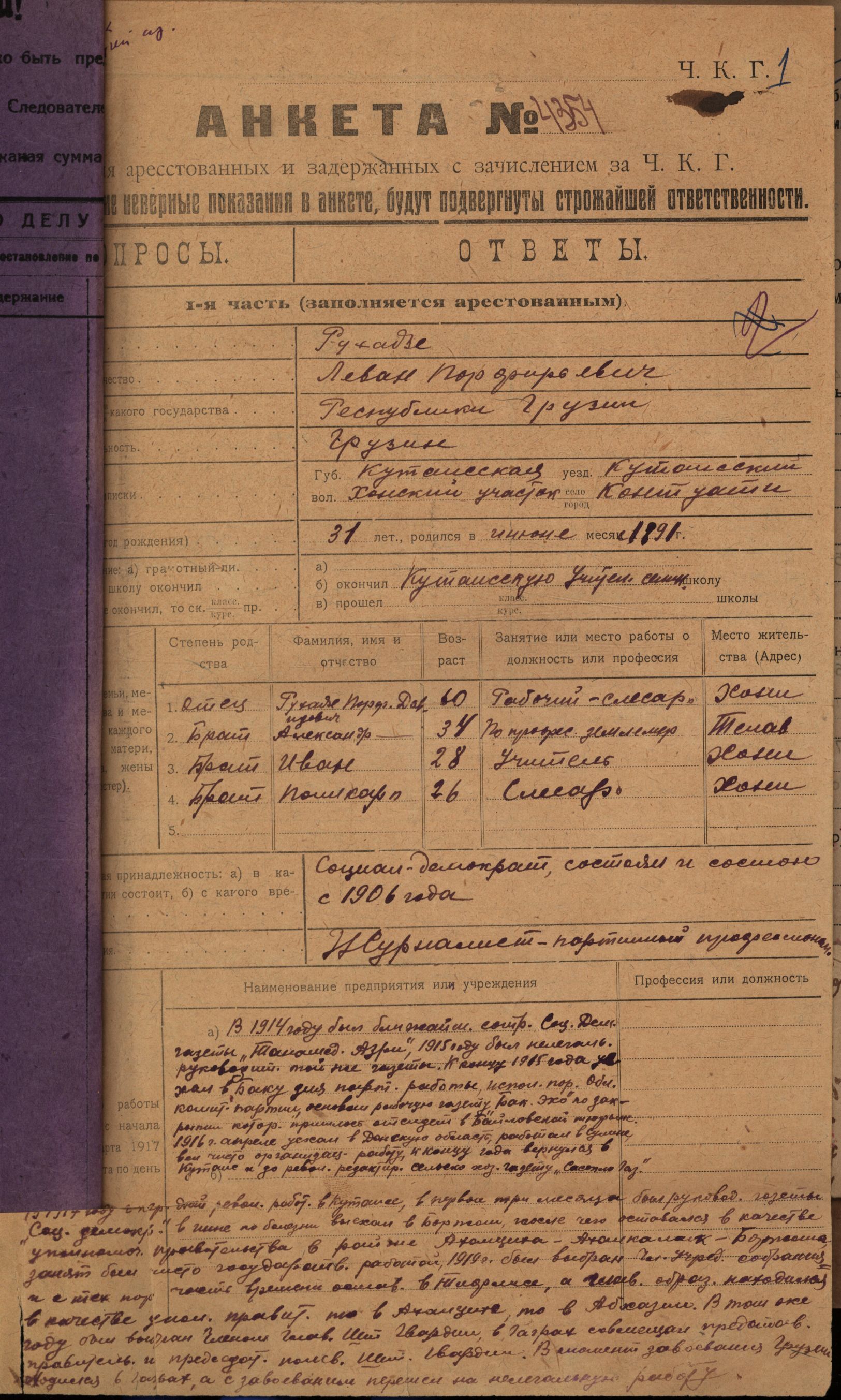
Arrested Leo Rukhadze’s Form from the 1922 Investigation Case
The minutes of Levan Rukhadze’s questioning is included in the case of 1922. Excerpt:
S. What is your opinion about the Soviet system in general and especially in Georgia?
P. Soviet system exists only in Russia. The Russian people elected the power they liked, I do not discuss this. The Georgian political system is not the result of internal developments. The Georgian people have not elected it but a foreign power, the Russian army brought it… The Georgia people fight for the restoration of independence and this is a fight between the two sovereign powers, Russia and Georgia.
S. How does the party look at hooliganism?
P. Negatively. Social-Democratic Party has never been and will never be the party of “Makhnovshchin”. It has a tested revolutionary way, which continues for the independence of the Georgian nation.
S. How do you look at the resettlement of your political friends in Europe?
P. Georgia is an independent state. It is temporarily under occupation. Before Georgia’s total annexation and the abolition of its sovereignty, it does not have a right to resettle Georgia’s citizens in Russia or anywhere else. The occupied government has a right to expel anyone from borders but the expelled should choose the place or refuse to be resettled and decide to die in his/her country. This is a right of a prisoner. Levan Rukhadze.
On 23 October 1922, the Presidium of the Special Committee decided to isolate Levan Rukhadze for an indefinite period.
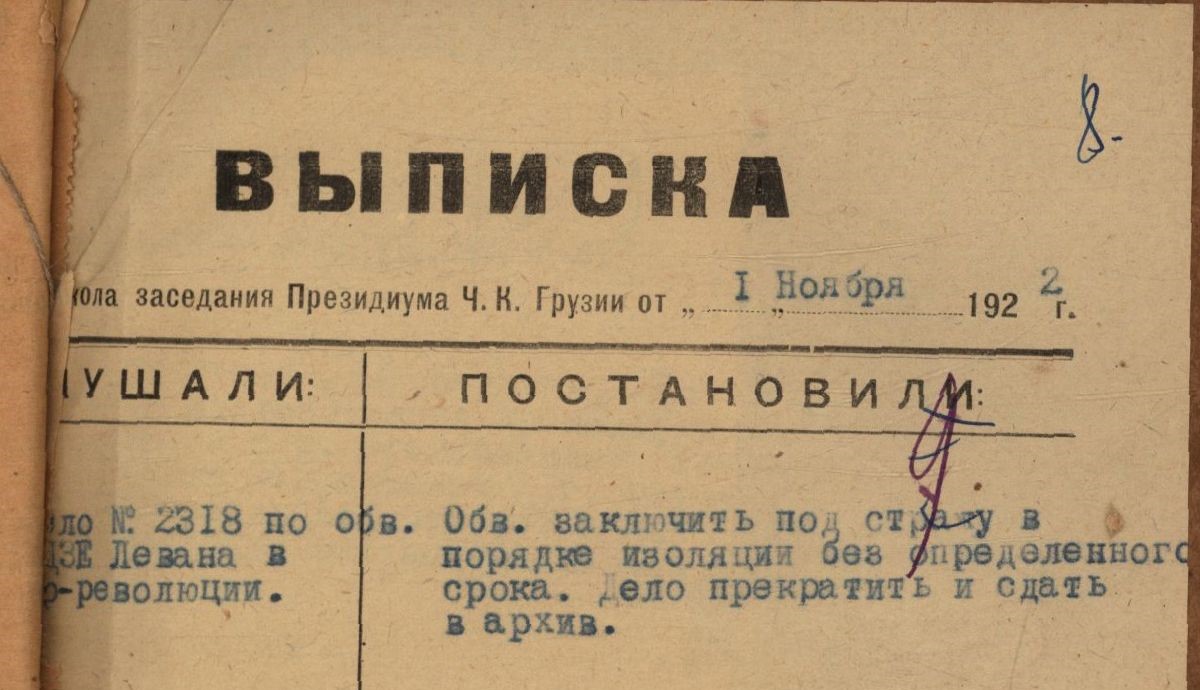
Levan Rukhadze’s second case dates back to 1936. This is a period when he had already spent 13 in resettlement, spent time in the two regions of Russia and cities – Yaroslav and Oriol. According to the documents, he returned to his motherland, Khoni, village Kontuati and did not plan any political activity. However, the repressive state machine thought otherwise and prepared another wave of repressions for him and thousands of more other people.
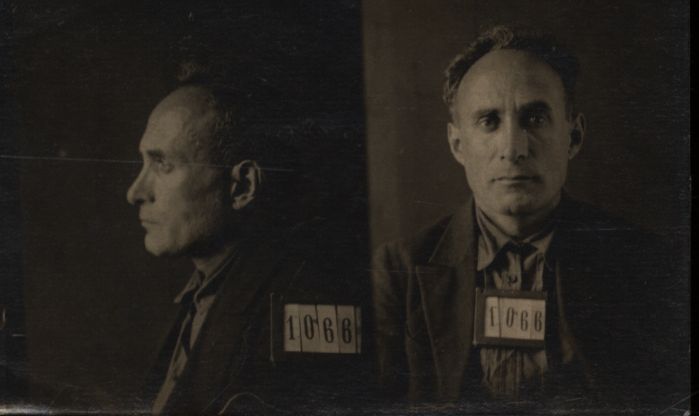
Arrested Levan Rukhadze’s Photo from the 1936 Investigation Case
The investigation case of 1936 starts with the filled form, in which it is mentioned that Levan Rukhadze is accused of “Menshevism”. The second document is a resolution filled by the security lieutenant, secretary approved by the Deputy People’s Commissar of Internal Affairs, Avksenti Rapava. According to the resolution, the order for arresting Levan Rukhadze was issued on 10 May 1936.
Born in 1893 [10], social status – serviceman, profession – economist.
Was held in custody for counterrevolutionary activities,
He has been found guilty of renewing anti-Soviet and counterrevolutionary activities.
Found guilty according to the Criminal Code. Articles 58.10, 58/11.
Besides the Secretary, the document is signed by the head of the second sub-division, Polshin and the head of the Secret-Political Department, Sultanishvili.
Leo Rukhadze was arrested on 12 May. This is proved by the minutes of inspection, according to which letters (7 papers), a letter for Comrade Beria (14 papers) and a passport were taken from him. His belongings confiscated in prison included a belt, tie, teaspoon, watch and 2 pencils.
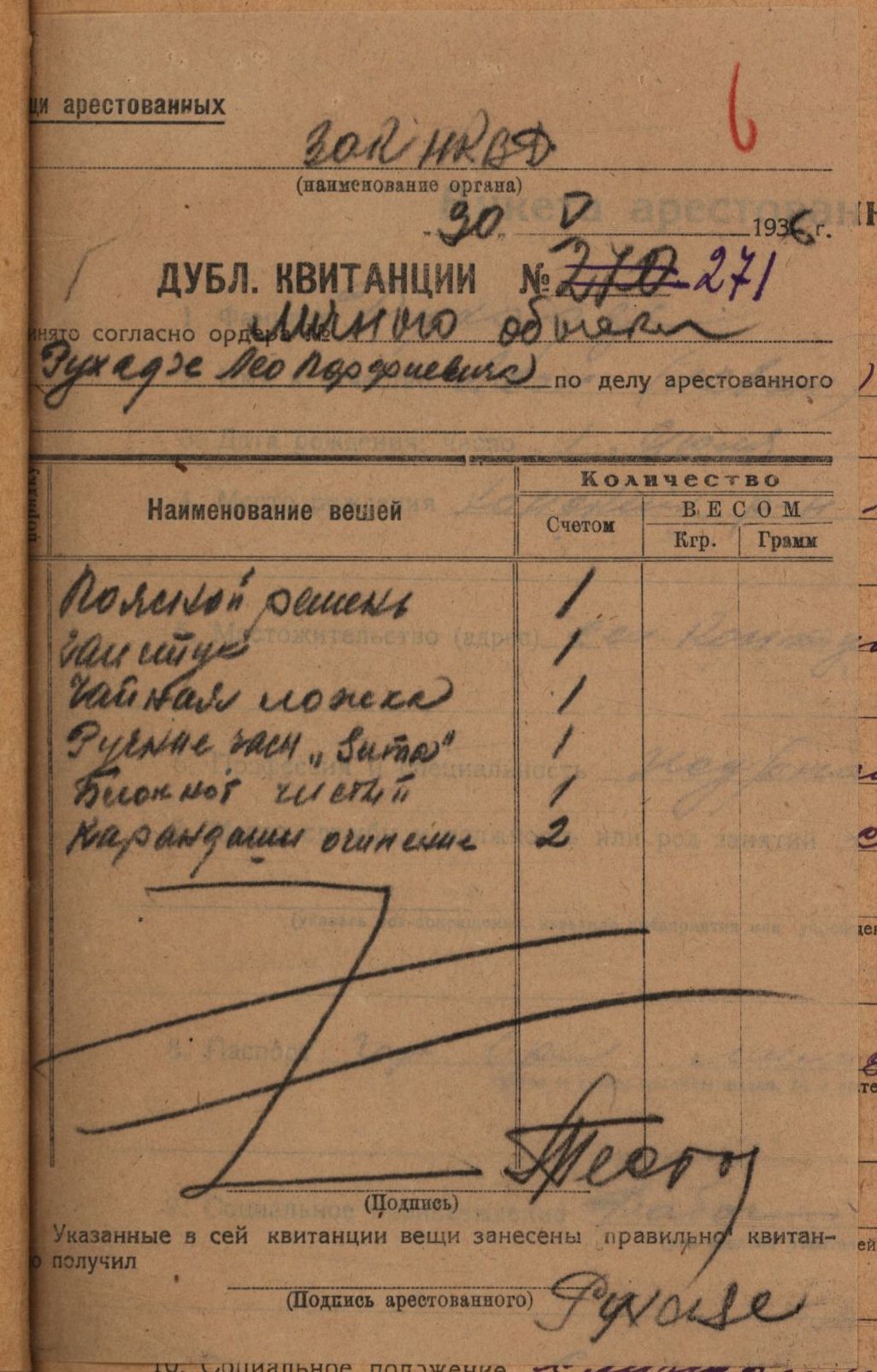
In another form, filled on 30 May, there is no different data. It is filled by the Head on the duty of the NKVD prison – Testov. Testov’s signature can be found on many acts on 1937-1938 repressions.
The minutes of questioning is another important document filled on 8 June. The investigation was carried out by the above-mentioned secretary. Several phrases were underlined with a pencil in the document and we will also emphasize them in the article.
Question: What role did you play in the party before the revolution?
Answer: I became a member of RSCLP in 1906 when I was still a boy. Before 1913, I worked at the Khoni organization… I was also a correspondent of the party press. In 1913-1914, I was one of the heads of the illegal typography, which functioned in Khoni. In 1914, I was a representative of the Tbilisi organization of the Menshevik’s South Caucasian committee. I was the organizer of the tramway drivers’ strike in June-July 1914. After transferring the daily newspaper “tanamedrove azri” from Kutaisi to Tbilisi, I was a member of the editorial board, which also included N. Ramishvili and N. Khomeriki. In 1915, the regional committee sent me to Baku, where I founded the daily labour newspaper, which was closed and confiscated after the publication of the first issue. After the closure of the newspaper, I had to return to Tbilisi first and then to Kutaisi, where I worked for the journal “sasoplo gazeti”. The revolution started when I was in Kutaisi in 1914-1916, carrying our illegal activities.
Question: How did you meet the establishment of the Soviet rule in Georgia?
Response: I shared the platform elaborated at the illegal conference in April 1921.
Question: So, did you consider that Georgia was annulled?
Response: Yes but the 10 April platform, which I shared, suggested the collaboration with the Soviet authority in case of fulfilment of the declared promises.
Question: Then why did you refuse to collaborate with the Soviet government and chose the way of resistance?
Response: The Menshevik Party remained inactive and fulfilled its promise for the whole of 1921, before October-November. In November, a delegation was announced in Sovnarkom with the memorandum, which proved that the promises made by the Soviet government were not being fulfilled. In response, the delegation was arrested in the palace, which encouraged me to start illegal activities and the party started the publication of proclamations. I worked on this before my arrest in October 1922.
Question: Which position did you hold in the party?
Response: From January 1922 until my arrest, I was a secretary of the Central Committee, Silibistro Jibladze was the head and he was replaced by Seit Devdariani after his death.
Question: What was your illegal work against the Soviet authority?
Response: Agitation and propagation of anti-Soviet ideas through the illegal press and national character.
Question: Who was in charge of the organizational issues from the Central Committee?
Response: It was 15 years ago and I do not remember many of them. Besides, the revolutionary ethic does not allow me to reveal these details. For this, I have already served a 12-13-year sentence.
Question: So, you refuse to give testimony on this issue, similarly to your previous arrest?
Response: Yes, I refuse.
Question: In your testimony, you said that you examined the establishment of the Soviet authority in Georgia as an occupation. Do you still support this opinion?
Response: Historical facts do not change in time.
Question: Whom did you meet in Oriol and what did you tell them about illegal work?
Response: Chikovani, Grigol Katcheishvili, Jghenti, Abashidze, Dolidze, Dzneladze and two or three more people, whose names I do not remember, were with me in exile. I did not hold political talks with them because they were apolitical figures.
Question : This is wrong , because the investigation precisely knows , that you were talking about the job contracts between the Mensheviks and Dashnaks. Who did you have these conversations with ?
Answer : There was no such thing .
Question : Name those displaced Dashnaks who you were personally meeting.
Answer : I do not have their names, I was just meeting them at the hair-salon at the Lenin Street , where I used to get shaved .
Question : After you returned to Khoni after the exile, have you travelled somewhere ?
Answer : Over the past year, the summer / August month / I went to the resort Manglisi. I have tuberculosis . In addition, I went to Surami through Tbilisi in November, were I visited my sick relatives and attended a woman's funeral in February 1936. I have not been anywhere else.
The protocol is spelled correctly in my words and I read it .
Questioned by СПО KGB ( State Security Committee, Secret - Political Section ) in the second section of the operative , junior . Leit . / Secretary /
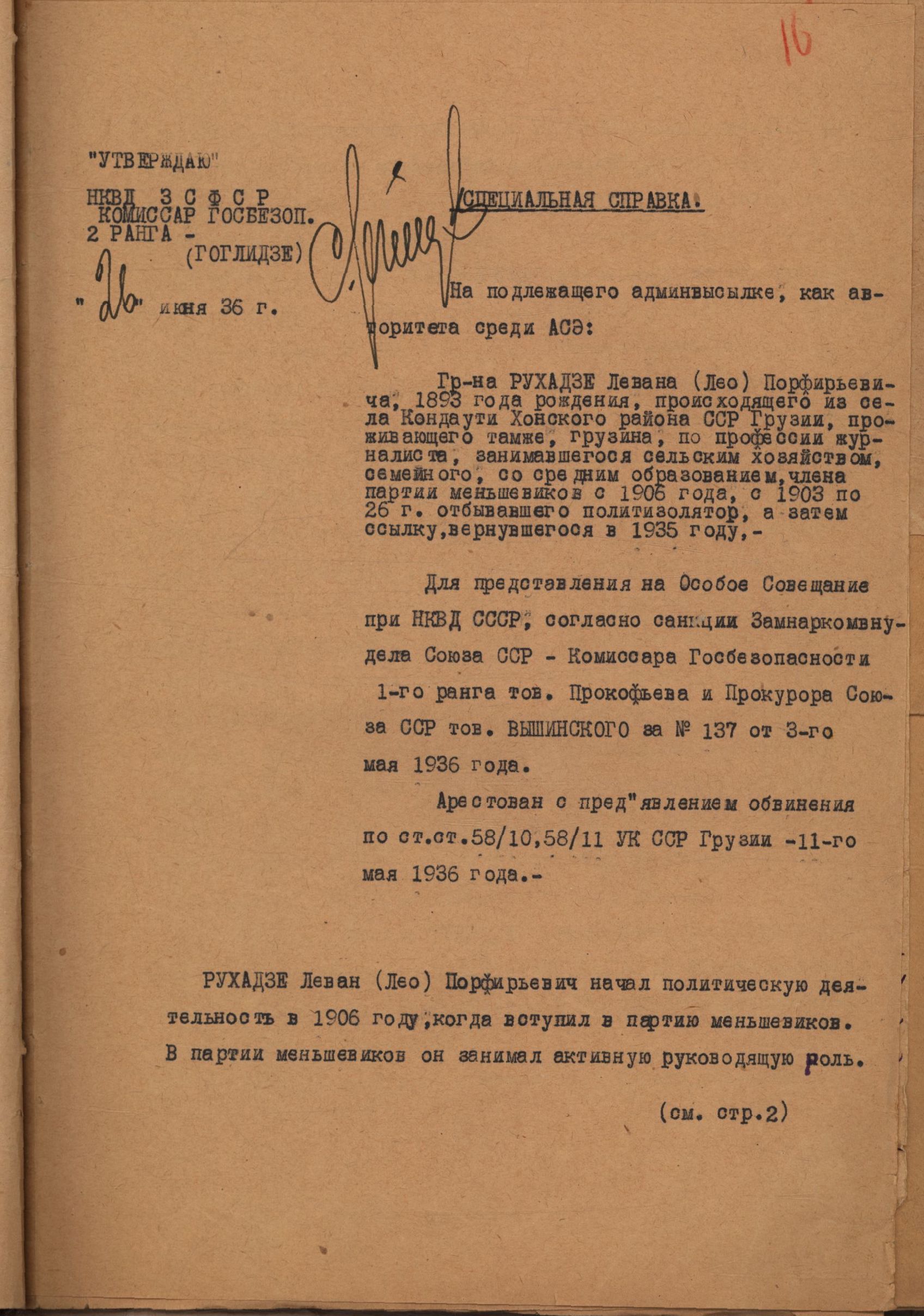
On 1936 June 26, the same secretary- Polshiny and Kavteladze- signed a special certificate , which was approved by the Transcaucasian Commissariat of Security Affairs Commissioner - Sergo Goglidze . The document contains a brief description of Levan Rukhadze based on his testimonies and biographical information . The notice ends with the following conclusion :
Rukhadze is a staunch enemy of the Soviet government , enjoying great authority among the Mensheviks .
One of the most important documents of the 1936 case is the statement made by Levan Rukhadze on June 25 to the People's Commissar of Internal Affairs Sergo Goglidze. The document clearly reflects the condition of political prisoners in prisons of that period, the food, overcrowded cells ... Also, the nihilism that Leo Rukhadze started to get - he is convinced that he is innocent and has been sentenced to 13 years for political activity, but he still does not ask for release because he knows that it would be in vain. Here is Levan Rukhadze's statement in full:
To Goglidze - Home Office of Georgia
Statement of the Political prisoner L. Rukhadze
On May 11, just on the anniversary of returning from exile in Russia, where I spent 13 years, I was arrested in the village - Kontuati (Khoni district) and I was placed in the internal prison of Shinsakhkom, Cabin 14. Until now, it was not clear to me why I was arrested, because after returning to Georgia, I did not take part in any political work, I was a doctor (I suffer from pneumonia) and I worked as much as I could on my father's land. During the interrogation, I found out that I was arrested for my worldview and not for any of my actions. Even more surprising to me was that I was asked only about my social democratic past, such as: what/who I was before the 1917 revolution and then during the Democratic Republic of Georgia as well as during the first years of the Soviet Union, before my arrest in October 1922, after which I was sentenced to almost 13 years in prison and the replacement. This ended my investigation, during which charges were brought under the Articles 58-10 and 58-11.
I repeat that after returning to my homeland I do not feel any guilt and I consider the articles of the indictment presented for this accusation as a repetition of the past accusations, for which I was already sentenced to 13 years in prison. No other justification can be found for the undeserved punishment that I now suffer from being in severe isolation. But for now, the abolition of this unjust sentence is not the subject of my request, but I would like to report on the conditions of my arrest and isolation and ask you to place me in the normal prison conditions appropriate to a political prisoner. For almost a month now, I have been placed in cell 14 (I spent three weeks in a cell in Kutaisi), which is very crowded with prisoners (instead of 6-7 people, we are 12-15 people), which makes it impossible to breathe in the cell. I am deprived of a prisoner’s walking time, I am not given magazines and newspapers, and most importantly, I live in this cell under hunger - I am given 500 gr of bread per day and watered down soup. During my 13 years of exile, I have been in many prisons, both in pre-trial detention and in solitary confinement for years, but I have never been provided such food by the prison administration. This meal is calculated for the prisoners in terms of their transmissions. And I was deprived of such possibility, not only now but ever. I have money to buy extra food.
So I am asking you to please improve the conditions of detention as follows: 1) Give me a cell where the number of prisoners will be appropriate, 2) Give me a daily walk designated for political prisoners, 3) Give me magazines, newspapers and books, 4) Give me a normal food for a political prisoner - tea, sugar, lunch with meat and dinner.
I do not ask you to release me. I will not be been able to live a more peaceful or loyal life than during that one year when I was returned from exile, after being sentenced to 13 years in prison and deportation for no apparent reason. I did not think that coming to my homeland and living in the countryside for a few months, separated from everyone and absolutely loyal, would be the reason of the new arrest for the past social-democratic activities. In such conditions, all I am asking for is to put me in the normal prison conditions of a political prisoner, because I am destined to be a prisoner even when I feel no guilt.
25 / VI-36, political prisoner L. Rukhadze, Cell. №14.
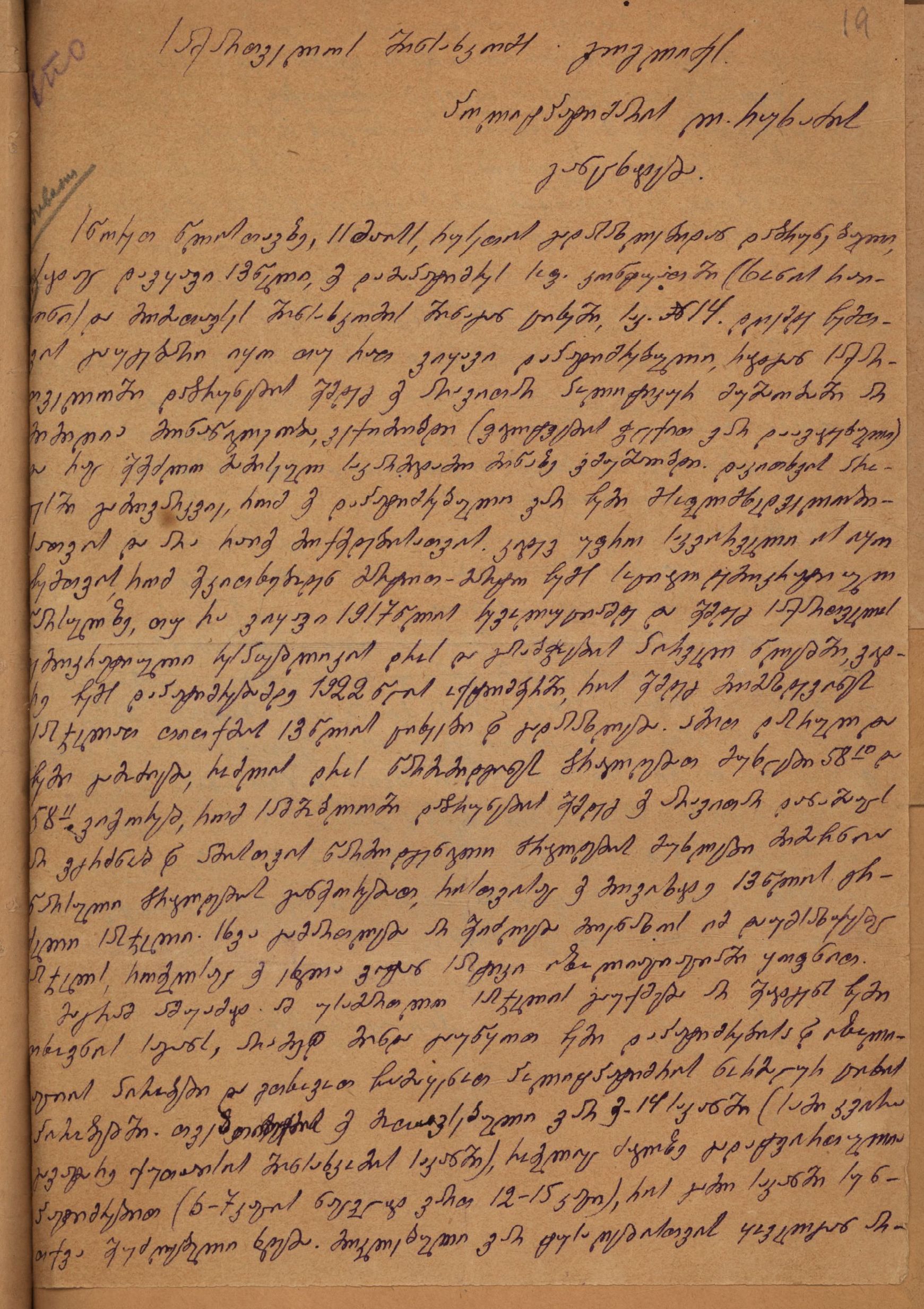
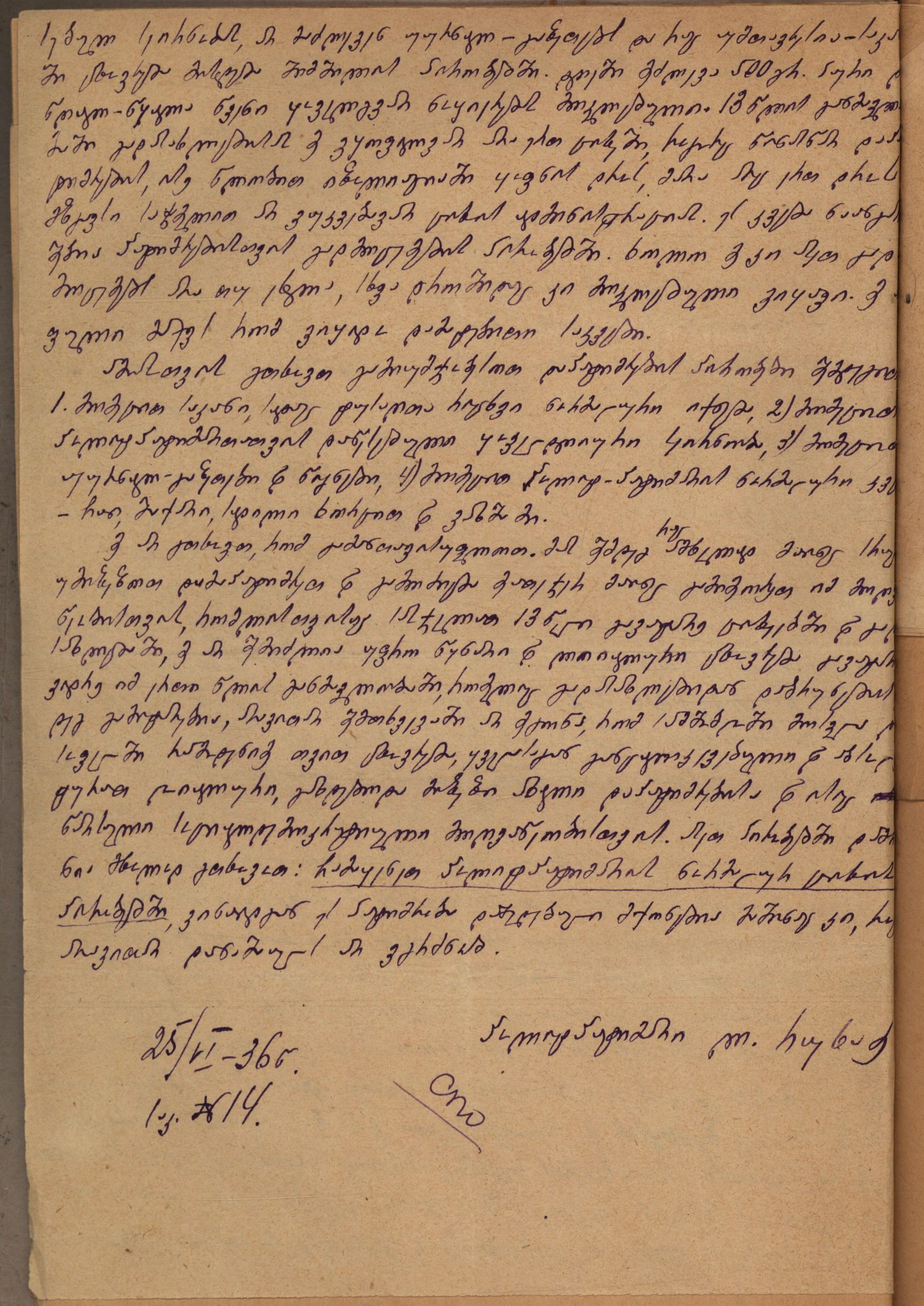
After these documents, several technical documents were sent to Moscow, as it was planned for Levan Rukhadze to be relocated. On September 4, 1936, the Soviet Home Office informed the Transcaucasian Home Office that Levan Rukhadze was to be sent to Almaty, Kazakhstan, at the disposal of the Kazakh Home Office. The decision on August 31 was officially adopted by the special commission at the Home Office and he was deported to Kazakhstan for a period of 5 years, and the starting date of the sentence was set for May 11, 1936.
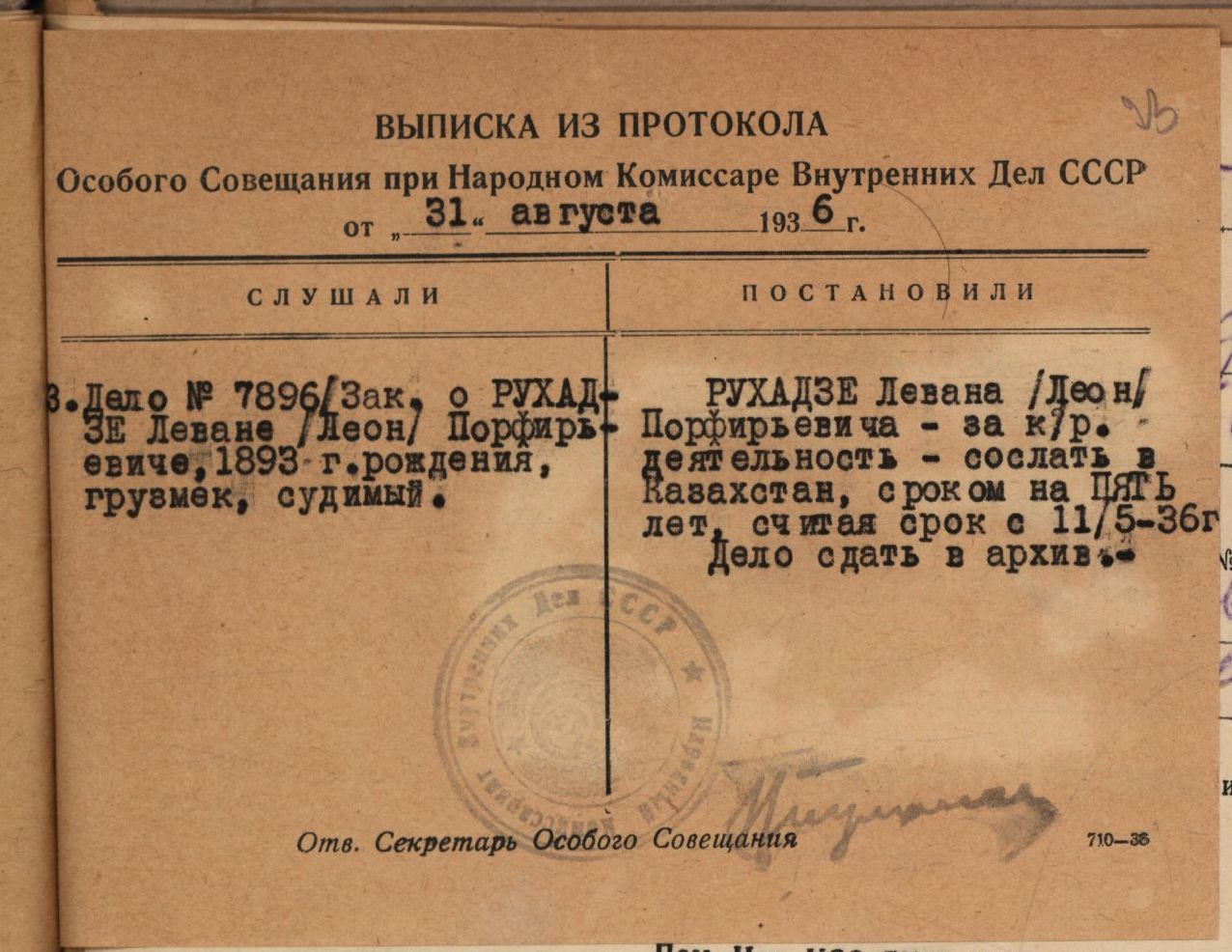
Among the documents of 1936, the special document is the -memorandum signed on July 1 by the Secretary and Sultanishvili. In one of the points of the questionnaire - "Is it possible to recruit a convict for some kind of work" - the answer was - "he will not recruit".

In Russia, in the State Archive of Socio-Political History (РГАСПИ) is reserved a letter sent to Moscow on July 8, 1937, to Stalin and the main perpetrator of the repressions, Ezhov by the Secretary of the Georgian SSR Communist Party Central Committee, Lavrenty Beria,. Beria informs the Politburo officials of the number of people registered in the first (shooting) and second (deportation) categories, and also clarifies that this number does not include those members of anti-Soviet parties that have returned from exile and those who have not been deported and are active in counter-revolutionary activities. Beria writes that up to 2000 such people will be gathered. Resolutions attached to the letter: approved (Утв..). St. (Stalin), V. Molotov, Kaganovich, Amkh. Molotov - I agree (За), Amkh. Chubari - I agree (За), Amkh. Mikoyan - I agree (За).
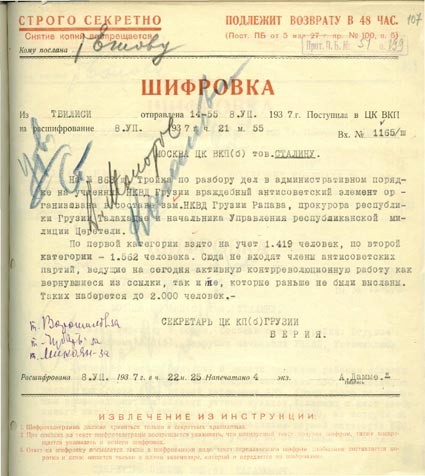
Beria's letter (ciphertext) to Stalin. Source: РГАСПИ. Ф. 17. Op. 166. Д. 575. Л. 107.
Eventually, Leo Rukhadze was among these 2,000 people ... Information on Levan Rukhadze is found in the database of the Society for Victims of Political Repression - "Memorial". According to this database, deported Rukhadze was arrested by the home office in Kazakstan on April 16, 1937. On October 23, he was sentenced to the highest form of punishment - shooting. [11]
In Levan Rukhadze's case, there are two documents from the later period: the first of them was sent on May 10, 1960, by the Security Committee of the Semipalatinsk District of Kazakhstan to the Archives and Accounting Department of the Georgian Security Committee. According to this document, Leo Rukhadze was shot in East Kazakhstan as per the order of the triumvirate.
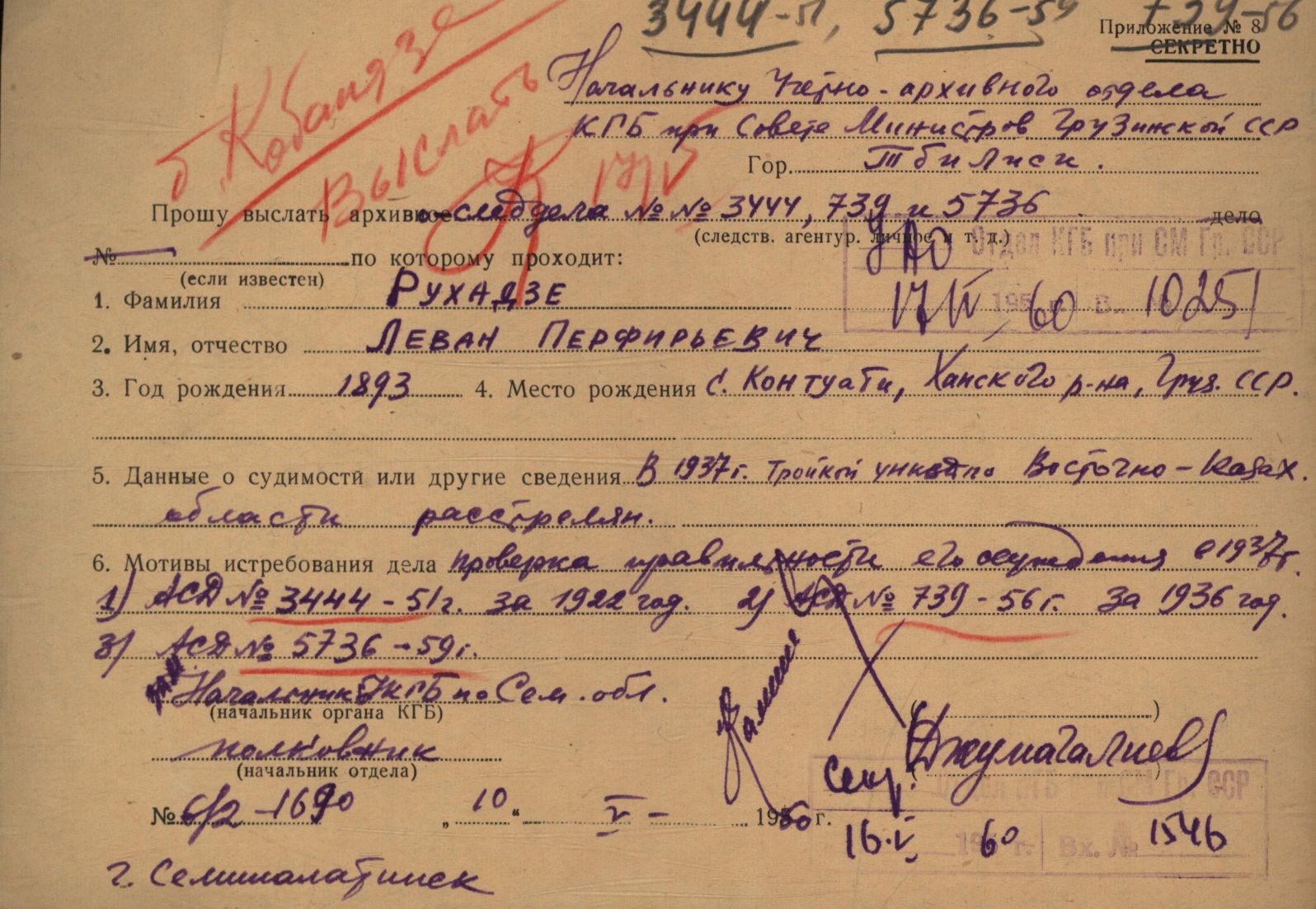
The second document is the decree of August 14, 1989, according to which Levan Rukhadze is subject to the decree of the Supreme Soviet of the USSR of January 16, 1989 - "Additional measures to restore justice to victims of repression during the period of 1930-40 and early 1950s." The document is signed by the Prosecutor of the Georgian SSR, State Counselor V.A. Razmadze. Interestingly, Levan Rukhadze was not rehabilitated in the 1950s, during a major wave of rehabilitation in the Soviet Union.
Conclusion
Much was not yet known to the public about Levan Rukhadze. His work was known only by the narrow specialists of the First Democratic Republic. However, the arrest cases show the authority of him as a political figure, as well as the strength of his character – through nearly none of the interrogations he did not speak anything of his accomplices and would answer the questions as generally as possible. All this has to be considered against the fact that during the repressions of the 1930s, the NKVD used the method of physical violence (torture) in practice, and since 1937 it has been officially used, under the direct command of Stalin. .[12]
Many facts of Leo Rukhadze's biography were unspecified before the study of the archival records kept in the family:
1922 was considered as the probable year of his arrest. According to the investigation documents it was confirmed that he was indeed arrested in October 1922.
Leo Rukhadze's date of birth was considered to be 1884 - which turns out not to be true. It is impossible for Rukhadze to have been in 1884, because in this case his age difference with Grigol Lortkipanidze (1881-1937) would be only 3 years. At the same time, it is known that Grigol would call Leo Rukhadze foster-son, and the latter would call him foster-father. Also in their common photo there is an apparent age-difference of more than 3 years.
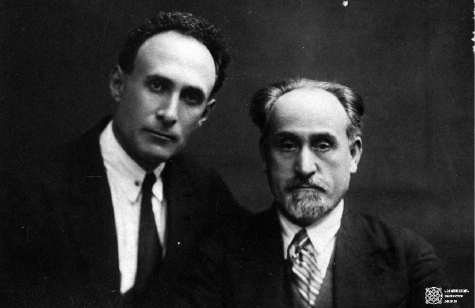
Levan Rukhadze and Grigol Lortkipanidze in exile. Source: National Archives of Georgia
In those two investigative questionnaires studied by IDFI, there are two indicative dates of Leo Rukhadze’s birth: he was born either on July 1, 1891 or on July 1, 1893. In addition, in a membership form of the Georgian National Council, Levan Rukhadze indicates his date of birth as 1894. This form is preserved in the National Archives of Georgia.
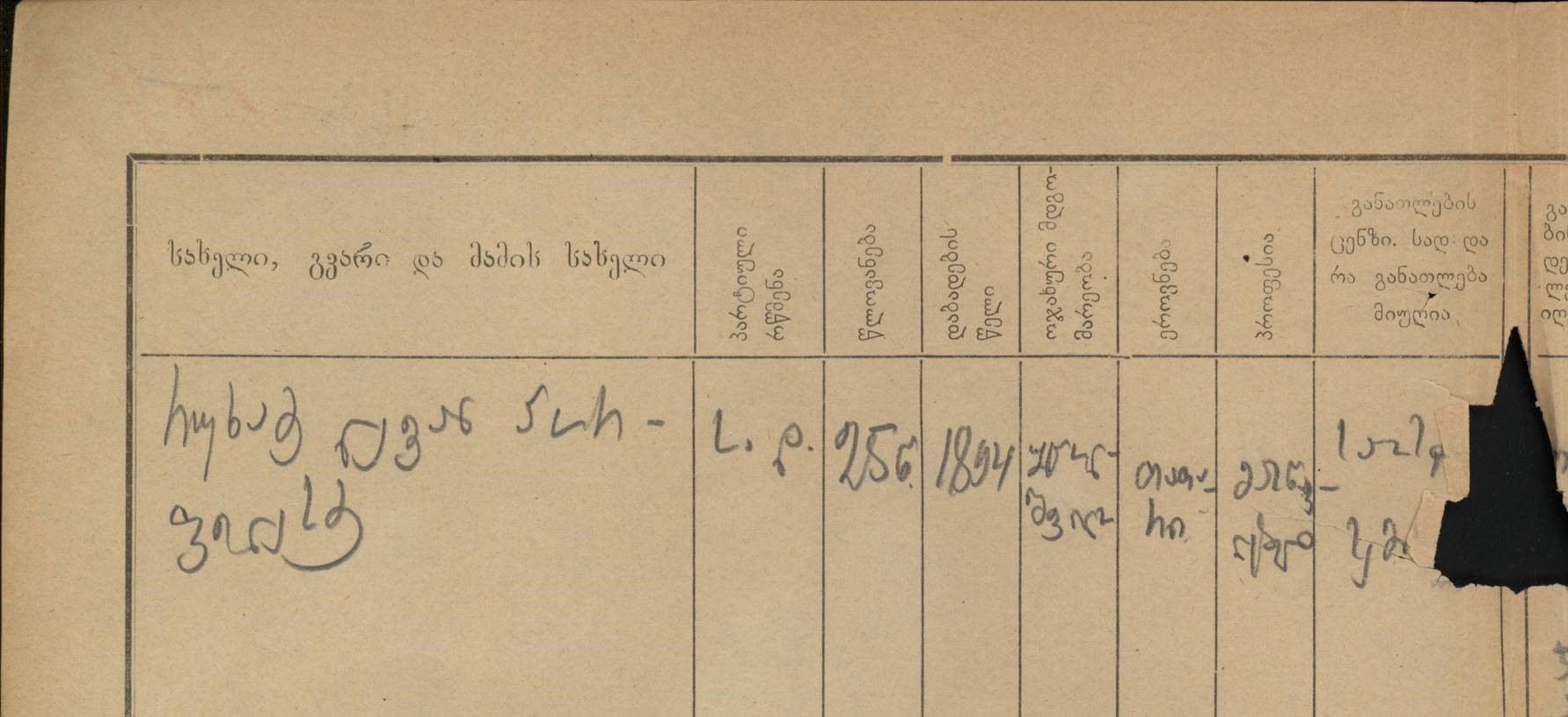
Leo Rukhadze's hitherto known biography nowhere mentions the fact that he was sent to Abkhazia as a representative of the government and a member of the General Troops of the People's Guard after working in the Akhaltsikhe-Akhalkalaki-Borjomi districts. The issue of Abkhazia was problematic in the Georgian Democratic Republic too- on the one hand, the "white" movement led by Denikin and Bolsheviks, on the other hand were trying to dominate the region, using local separatist forces. The Republic of Georgia was sending only the experienced politicians to Abkhazia, who were trusted to deal with many problematic issues at the same time.
The Bolshevik occupation of 1921 happened exactly when Levan Rukhadze was in Abkhazia, near the Georgian border, Gagra - on February 17, the 31st Division of the 9th Army of Soviet Russia invaded Abkhazia. Forces stationed along Georgia's northwestern border were forced to leave. On February 22, Soviet troops occupied Gagra and camped themselves along the banks of the Bzipi River. On March 1, the Soviet Army launched an attack in the direction of New Athoni [Akhali Atoni]. On March 3, Soviet troops broke through the defenses of New Athon, captured Sukhumi on March 4, and announced the establishment of Soviet rule there. On March 6, the Provisional Revkom of Abkhazia ceased to exist and power was transferred to the occupation body set up by the Kavbiuro - the Revkom.
E. Eshba became the chairman. The members were: N. Lakoba and N. Akirtava. [13]
Based on the documents in the case of Leo Rukhadze's arrest in 1922, it is probable that Levan Rukhadze was one of the main actors in the above-mentioned, still completely unexplored events.
Leo Rukhadze was deported from Georgia before his final arrest in Kazakhstan, after which he was sentenced to death. This important detail of his biography became known from the newly discovered archival material. In 1935 he returned to Georgia and intended to continue living on his homeland, but he was not allowed to do so by the repressive system.
The documents demonstrate those general conditions of prisoners during the 1930s: overcrowded cells, malnutrition, informational vacuum, and a ban on walking outside of the cell. All of this was aimed at worsening the situation of political prisoners in order to create an additional pressure and inconvenience on those repressed on political grounds. This measures were also aimed towards retrieving more information from the testimonies and arrest as many people on political grounds as possible. However, breaking Leo Rukhadze down was not an easy task, as one of the questionnaires states - "he was not a subject to recruitment."
The documents once again prove the absurd nature of the "Stalinist terror" of the 1930s: completely innocent people were prosecuted and sentenced to the highest measure of punishment – shooting.
Many necessary and previously unknown details of the biography of Levan Rukhadze, an important political figure, have been clarified by the archival records kept in the family. In the near future, IDFI will study and publish the investigative cases of Levan Rukhadze's two brothers, Polikarpe and Ivane Rukhadze.
/public/upload/Analysis/Levan Rukadze Doc1.pdf
/public/upload/Analysis/Levan Rukadze Doc2-min.pdf

This material has been financed by the Swedish International Development Cooperation Agency, Sida. Responsibility for the content rests entirely with the creator. Sida does not necessarily share the expressed views and interpretations.